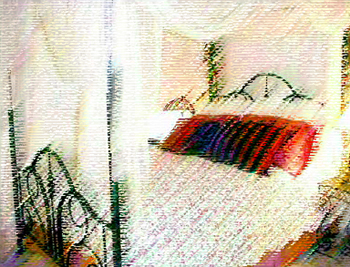|
Cinderella(continued) I walked into her ivory crème bedroom. Her porcelain lamp shed
a glimmer of light in her room, reflecting her pale skin. Her raven
black hair twinkled in the light as she lay motionless on her bed. She
inhaled and exhaled gently, coughing once or twice. Her bed was surrounded
by many photographs on dusted frames. Each frame held a portrait from
her past, each possibly giving a clue to the type of person she was.
From what I saw, she attended many parties with friends who wore eyeliner
and fishnet stockings. She never smiled in class pictures. She dressed
up as a vampire for the Halloween parade. She also collected James Dean
posters. As I stared at each photo, she gently moved and opened her
eyes. We stared at each other and said nothing. She reached out her
arms. We held onto each other. I was hugging a stranger, my cousin Cindy.
Despite this, I wanted to cry and say how sorry I was. She was so thin
and fragile within my arms. I felt her spine slowly arched against my
fingertips. Her hair, which turned out to be a wig, fell off, revealing
an oval shape head. She giggled, murmuring, "Shit happens."
In our first encounter with each other, I learned unusual words, such
as "chemotherapy" and "lymphatic." She showed me
the lumps on her neck, swelled flesh with deep lilac tones. She insisted
that I touch and press against the cluster of cells combating her immune
system. There was an ongoing war inside that thinning body. The cause
was unknown, but no one ever remembers why a war starts, only who wins.
However, her optimism assured me that maybe she had a chance. Maybe
she would be victorious. Cindy could become healthy again and continue
on with her usual routine of parties, shopping at Hot Topic and applying
to Columbia. We would go our separate ways, only remembering our first
and last encounter. I took a white handkerchief lying near the nightstand
and gently wiped her sweat-drenched forehead. She was heating up with
fever. Now, be assured that I didn't want my cousin to have cancer or
to be in any danger of dying. On the other hand, was it possible that
this cancer, the physical war occurring inside her, was the key to our
possible friendship? Dare I call this cancer a blessing in disguise? During our brief meeting, we barely mentioned her disease. Rather than
me asking her all the typical questions, like "how," "when,"
or "why," she questioned me on my life. I carefully phrased
each word out of my mouth. I didn't want to sound like I was living
an amazing life: attending college with wonderful friends and a loving
boyfriend. These were things Cindy could have had, if it wasn't for
her disease. At the same time, I didn't want to sound like I had no
life, due to final exams at the university; but then again, her own
life was in much greater shambles. Somehow, I was able to make her laugh
every so often with jokes in our native Spanish. Her faint smiled disappeared
as she explained that she loses a pound a day, something she might have
previously appreciated. She wanted to go wig shopping after her appointment
the following day. Knowing of my passion for shopping, she invited me
and, of course, I agreed. We exchanged kisses, and I left the apartment.
A nagging feeling reminded me that I would have to play another act
by accompanying her, a cheerful one implying enthusiasm. I wanted our
day to be a pleasant one, but the reasons for shopping weren't. Why
had Cindy invited me? Was it because I was the only one that hasn't
openly concluded that her young life would come to an end? Was it that
she merely couldn't witness the constant tears of her mother or the
multiple questions of "how," "when," or "why?"
Maybe she was just as curious as me. Maybe she wanted to know the cousin
only known from stories passed down by her mother. She wanted to meet
the isolated writer with the 3.5 GPA who listened to metal and adored
The Nightmare Before Christmas as much as she. We were both amused
with the idea that, with only having two years separating us, maybe,
just maybe, we could be friends. Our yearning to learn more about each
other, sparked by her physical pain, was bittersweet. The following day, we met in All That Glitters, a hole in the wall
wig shop a few blocks from her apartment. The store, a favorite for
the female Hasidic Jews who attend Yeshiva University, had a wide selection
of wigs, from "an eventful day for a lady" to "a glamorous
night on the town." Each wig was an illusion to hide a bad haircut,
someone's real hair, or, in Cindy's case, cancer. My cousin, wearing
an oversized black trench coat and a matching beret, looked small and
delicate. I wanted to cry, but I held back any signs of grief. |

